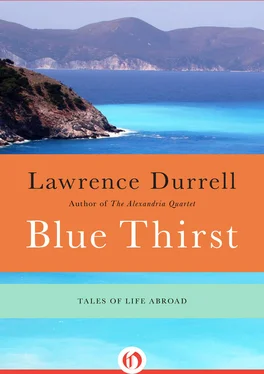And then there were other extraordinary matters like those recounted by Ralf Brewster, who died recently, and who wrote two or three good books about Greece. When he was a student he was studying in Austria, he went down and spent a summer in the islands — he spoke good Greek — in a caïque. And in Siphnos one afternoon they found the museum wide open and the guardian asleep under a tree. He just said, “Go on, have a look around.” So Ralf looked around and there was a beautiful little statue of a Pan lying on its back among the nettles in the garden, completely untended. And Ralf, who suffered from cupidity like us all, picked it up and put it in a shopping basket and carried it back to the caïque and took off with it for Austria. Well, nothing was heard of this loss for a little while, but the curator must’ve noticed it was missing and unluckily for Ralf, they suddenly discovered it was one of the most celebrated examples of its period. It appeared as an illustration in all the history books and it was really a national trophy that the Greeks couldn’t afford to part with. They traced it to this youthful criminal — he was then a student at the university — and they threatened all kinds of actions against him, through the Austrian government. He probably risked a prison sentence, and he had to return this thing. Well, he returned it and he was blackmarked and couldn’t go to Greece for five years after that. But when the sixth year came he managed to get a visa and he went back and in passing Siphnos again, out of curiosity he called in to have a look at the museum and he couldn’t find this trophy anywhere in the museum and said, “Oh well, they must’ve taken it to Athens.” Then he went outside in the garden and there it was in the same place, lying in the bushes where he’d found it first. On its back.
In this tiny community — it was a hamlet of about four houses — we had one doctor who was highly eccentric, who wasn’t a doctor at all. In the town of Corfu there were some highly trained medical people and a good surgical laboratory, a good hospital and people trained at places like Edinburgh and in Paris, but in this tiny hamlet there was one old doctor on a bicycle. At the end of the war with the Turks there was a great shortage of doctors so the Greeks took all the pharmacists in Athens and created them doctors and sent them to the front. Then afterwards you couldn’t take away their license to practice, so there were a great number of elderly men practising quite ad hoc in all these villages. And then there were the women bone-setters and herbalists who were much better than the old men and the only other literate person was Niko, the village schoolmaster. And a delightful priest who was extremely drunk most of the time. But he used to give tremendous services and excommunicate everyone from time to time and then take them back, you know. It was a small community and very tightly knit. I should suppose that you would find in an Irish island or in the Isle of Aron something rather comparable. But meanwhile, as a poet of 21 or 22, I had the most extraordinary stroke of luck — in fact the more I think of it the more amazing it seems to me — for if you cut yourself off from the ordinary literary life with all the things it has to offer you and you decide to go sit on a Greek island you would never hope to have the sort of friends I as a boy of 22 acquired almost by divine accident. I was later to call them my uncles, none of them wicked, all of them good. I had two American uncles at that time. They didn’t come at once. First, I had T. S. Eliot as a publisher who guided and helped a great deal and consoled me against the loneliness of living in such circumstances. It was beautiful but it was terribly lonely. And then Henry Miller started bombarding me from Paris with a great deal of encouragement and documentation and masses of ideas. He was full of energy and enthusiasm which were wonderful guidelines for a young man. And then the other two uncles were Greek. One of them was George Katsimbalis, the Colossus of Maroussi. And the other one was Seferis who won the Nobel Prize later on. The quality of their sort of life style was such that it couldn’t help inspiring you. I remember Seferis as a diplomat saying to me one day, “You know the old story about the pearly gates and St. Peter — I was thinking of it today at this awful reception.” He went on, “I was thinking that if when I went to heaven St. Peter asked me ‘What the hell have you been doing with your life down there?’ the only thing I could really point to excuse it was my poems, and they’re not good enough.” And then I remember Miller saying “You know I never really believed in my vocation as a writer but now I realize I’m a protected person.” It does suggest an eye out for another kind of life. And so parallel to this rather rocky life I was living was a frightfully intense interior life which was centered more or less on trying to shape myself into some sort of artist. And these people stretched out hands — touch, touch — and I felt in contact, and it’s quite marvelous to be in contact though you’re quite on your own and far away. It’s a privilege accorded to few people. And so when I met Miller in Paris I took him back to Corfu and he wrote this good book about it. And when I went to Athens I took up with Seferis and Katsimbalis and his strange friends — he had a sort of Wuthering Heights of a house where numberless barrels of wine always seemed to be leaking all over everything. And on this creaky balcony, first weekend in Athens that I was there, I took Miller and Seferis and Katsimbalis and two other writers met in the evening to read verses. It was extremely memorable because the reading got steadily thicker and thicker because of the retsina, which was extremely powerful. And at night our wives came and fanned us with leaves and implored us to stop. In those hard Attic nights, Miller, I think has given the best description of them, the extraordinary dry heat — you’re panting on the one hand because it’s hot and yet on the other hand you’re not sweating. It’s most extraordinary. You can walk at night with a clear electrical feeling. The actual violet of the dusk and the actual violet light which seems to play about Greece is something that’s always impossible to describe. We’ve all tried it. It doesn’t work in words and I don’t think it works in paint really. It’s a very peculiar thing. If you ask yourself, for example, what is Greece that Italy isn’t, or Spain isn’t, it’s just precisely that curious magnetic violet X-ray dancing light, and I suppose also the feel always of water, either spring water, which you need urgently because you’re like a thirsty dog in summer — even the electric light bulbs in a café give off so much heat that you can hardly stand them. You have to turn them off. And it’s the water and it’s the feeling of the light winds that girdle the Aegaen group of islands, which makes the nights delicious, particularly delicious, and the afternoons, with the good sailing wind that comes, the meltemi, and which sinks at dusk and allows you to bring boats in harbor perfectly calmly and sit down and watch everything settle into a pool of liquid. Cool nights, terrific stars, and heavy dew condensing like Scotch mist on your blanket. Into the sea at six, like diving into a mirror.
The poets themselves, particularly the country poets, have wonderful metaphors for the star display that comes immediately after the falling of the deep dusk. For the Milky Way they say that it’s like scattered flour and for the other stars — and such a display of stars those of you who’ve been to Greece will know what I’m talking about — simply breathtaking — they say it’s like a branch of an almond tree, a wreath of almond blossom, raised upon the night. Well, together with these poets I also met very briefly, and I can’t claim to know him very well, the author of Zorba, Kazantzakis, and a highly dramatic, flamboyant poet called Sikilianos who, with his American wife, reinvented the festival of Delphi, which for nearly 20 years was one of the most singularly spectacular festivals of Greece, and really put cultural Greece on the map. And he was a very amusing, delightful and enormously flamboyant poet of the old school, very theatrical. I heard an anecdote which illustrates that particular kind of Greek temper. One night he was dining with Seferis, my friend, Kazantzakis and himself in a little tavern near Mycenae, and he was saying how really the poet could do anything, there was simply nothing that was beyond his powers. And that Jesus was a poet and that he, Sikilianos was also a poet and that really if the poet had the thing in him he could even raise the dead. Miracles like that were no surprise. Well, he was talking in this vein and the innkeeper came out and said to him, “A chap just died upstairs, perhaps you would like to try.” Well, Sikilianos is not the sort of person to be put off by that at all — he said, “What a good idea, I’ll try; you’ll see.” And so he went upstairs. They didn’t know what he did, perhaps he murmured. Perhaps he recited poetry; they heard all sorts of incantations and so on. And finally he came down and said, “He’s so damned obstinate.”
Читать дальше












